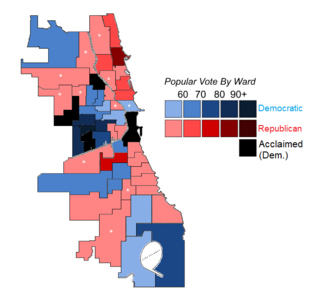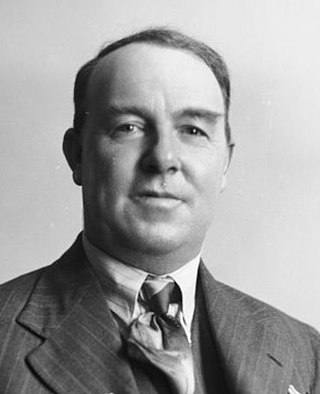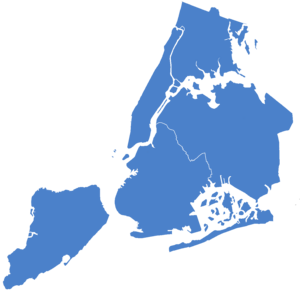
The 1929 Chicago aldermanic election was held on February 26, 1929, with a runoff on April 2, to elect the 50 members of the Chicago City Council. The elections were non-partisan. Held in the middle of mayor William Hale Thompson's term, it would be the penultimate midterm election; four-year terms for aldermen were adopted in 1935, coinciding with the mayoral election that year.

Elections were held to elect the New York City Board of Aldermen on November 5, 1929, in concert with other such contests as the Mayor, the Comptroller, the President of the Board of Aldermen, Borough presidents, County Sheriffs, and other miscellaneous questions.
Martin F. Tanahey was an American politician who was the alderman of New York City's 1st district from 1922 to his death in 1930. A Democrat, he served much of the Lower East Side and Financial District in Manhattan.

Elections were held on November 2, 1937 to fill the New York City Council, which had just been formed to replace the New York City Board of Aldermen. The new Council comprised 26 members elected via proportional representation by borough, in contrast to the 65-member Board of Aldermen elected by district. This was done in response to the large majorities the Democrats often received in the Board of Aldermen. Each borough was entitled to one member of the council for each 75,000 votes cast, and an additional member for each remainder greater than 50,000. Due to voter turnout, Brooklyn was entitled to nine members of the Council, Manhattan six, Queens and The Bronx five each, and Richmond one.

Elections of New York City's borough presidents were held on November 5, 1929, in concert with such contests as the mayoralty, Comptroller, aldermen, County Sheriffs, Aldermanic Board President, and other miscellaneous questions on the ballot. Democrats were elected in all Boroughs except Queens. This and Democratic victories in other contests were all a part of what was considered "a Crushing Defeat to [the] City G.O.P. [delivered]" by Tammany Hall.

An election was held on November 5, 1929 to elect the President of the New York City Board of Aldermen, in concert with other such contests as the mayoralty, Comptroller, the remainder of the Board of Aldermen, County Sheriffs, Borough presidents, and other miscellaneous questions on the ballot. Democratic incumbent Joseph V. McKee of The Bronx defeated Republican candidate Bird Sim Coler of Brooklyn, himself an independent Democrat, 890,655 votes to 385,514. This combined with Democratic victories in other contests formed what was considered "a Crushing Defeat to [the] City G.O.P. [delivered]" by Tammany Hall.

An election was held in New York City to election the President of its Council on November 2, 1897. The charter of the new City of Greater New York had created a bicameral Municipal Assembly, comprising an upper Council and a lower Board of Aldermen. The Council president was elected citywide while the Board of Aldermen elected its own president.

An election was held on November 7, 1933 to elect the President of the New York City Board of Aldermen, along with other contests such as the mayoralty, Comptroller, and aldermen. Democratic incumbent Joseph V. McKee had resigned earlier in the year to assume the office of Mayor after Jimmy Walker had resigned that position, and the aldermanic presidential post was occupied by Dennis J. Mahon in the meantime. Republican candidate Bernard S. Deutsch defeated Democratic candidate Milton Solomon and Recovery Party candidate Natan Straus Jr. to win the position.

An election was held to fill the Municipal Assembly of the newly-created City of Greater New York on November 2, 1897. The charter of the new city had created a bicameral Municipal Assembly, consisting of an upper Council and a lower Board of Aldermen. Each chamber was elected from specially-made districts. In addition, the president of the Council was elected in a separate election on the same day.

The 1938 Christchurch City mayoral election was held on 11 May. The incumbent, John Beanland of the Citizens' Association, failed to get the nomination by his party and the surgeon Dr. John Guthrie was nominated instead. The Labour Party nominated Robert Macfarlane. Both the Labour and conservative candidate had been members of Christchurch City Council for some years. Macfarlane narrowly won the mayoralty.

The 1941 Christchurch City mayoral election was held on 17 May. The incumbent, Robert Macfarlane of the Labour Party, did not stand for re-election as he wanted to serve in WWII. Four candidates stood and Ernest Andrews of the conservative Citizens' Association was successful. Andrews was installed on 28 May 1941.

John Holmes Jackson was an American politician who served as the 24th and 26th Mayor of Burlington, Vermont. His initial narrow ten vote victory in 1917 against incumbent Albert S. Drew is the closest mayoral election in Burlington's history, although Clarence H. Beecher's 1927 victory was decreased from 89 votes to 8 votes by a Supreme Court ruling in 1929, and wasn't matched until Bernie Sanders won the 1981 mayoral election by ten votes after a recount.

Clarence H. Beecher was an American physician and politician who served as the 25th Mayor of Burlington, Vermont. His eight-vote victory against James E. Burke in 1927 is the smallest margin of victory in any Burlington mayoral race.

The 1929 New York City mayoral election was held on November 5 in concert with other municipal elections. Democratic incumbent Jimmy Walker defeated Republican challenger Fiorello H. La Guardia in what was considered "a Crushing Defeat to [the] City G.O.P. [delivered]" by Tammany Hall. Socialist candidate Norman Thomas also ran, as did Socialist Labor candidate Olive M. Johnson and former Police Commissioner Richard Edward Enright for the Square Deal Party.
Augustus F. Pierce was an American politician who served as the Tammany Hall leader of the Bronx's 8th assembly district in New York City until his death in 1934. An employee of the city since 1907, at the time of his death he worked for the Department of Sanitation.

Louis F. Dow was an American businessman and politician from Burlington, Vermont. A Republican, he was most notable for his service as the mayor of Burlington from 1935 to 1939.

The New York City mayoral election of 1933 took place on November 7, 1933 in New York City. Incumbent Democratic Mayor John P. O'Brien, who was elected in a special election after the resignation of Mayor Jimmy Walker, faced Republican Congressman and 1929 mayoral candidate Fiorello La Guardia, and former acting mayor and President of the New York City Board of Aldermen Joseph V. McKee, who became acting mayor after Walker's resignation until the special election, and ran on the Recovery Party line.

Beginning shortly after the city's incorporation as a city in 1846, elections have been held in the mayor of Manchester, New Hampshire. The following article provides information on the elections for mayor in the city during the 20th century.
Harry John Karns was an Arizona politician who served a single term in the Arizona State Senate during the 2nd Arizona State Legislature. He served 3 consecutive terms as mayor of Nogales from 1927 to 1933. While in office, he oversaw the paving of the streets of Nogales, installation of a sewer system, and street lights.

The 1844–45 Boston mayoral election saw the election of Native American Party nominee Thomas Aspinwall Davis as mayor of Boston. The election took eight votes, as no candidate secured the needed majority in the first seven attempts. Incumbent Whig Party mayor Martin Brimmer was not a nominee reelection.















